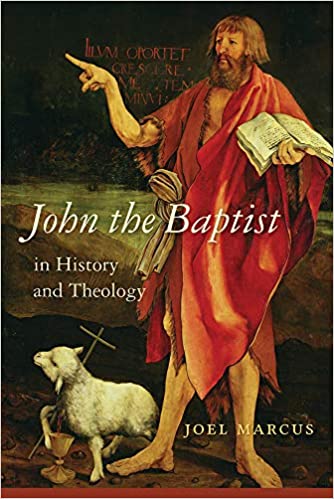File:2018 Marcus.jpg
2018_Marcus.jpg (334 × 499 pixels, file size: 36 KB, MIME type: image/jpeg)
Joel Marcus, John the Baptist in History and Theology (Columbia, SC: University of South Carolina Press, 2018)
Abstract
"While the Christian tradition has subordinated John the Baptist to Jesus of Nazareth, John himself would likely have disagreed with that ranking. In this eye-opening new book, John the Baptist in History and Theology, Joel Marcus makes a powerful case that John saw himself, not Jesus, as the proclaimer and initiator of the kingdom of God and his own ministry as the center of God's saving action in history ... Although the Fourth Gospel has the Baptist saying, "He must increase, but I must decrease," Marcus contends that this and other biblical and extrabiblical evidence reveal a continuing competition between the two men that early Christians sought to muffle. Like Jesus, John was an apocalyptic prophet who looked forward to the imminent end of the world and the establishment of God's rule on earth. Originally a member of the Dead Sea Sect, an apocalyptic community within Judaism, John broke with the group over his growing conviction that he himself was Elijah, the end-time prophet who would inaugurate God's kingdom on earth. Through his ministry of baptism, he ushered all who came to him―Jews and non-Jews alike―into this dawning new age. Jesus began his career as a follower of the Baptist, but, like other successor figures in religious history, he parted ways from his predecessor as he became convinced of his own centrality in God's purposes. Meanwhile John's mass following and apocalyptic message became political threats to Herod Antipas, who had John executed to abort any revolutionary movement ... Based on close critical-historical readings of early texts―including the accounts of John in the Gospels and in Josephus's Antiquities―as well as parallels from later religious movements, John the Baptist in History and Theology situates the Baptist within Second Temple Judaism and compares him to other apocalyptic thinkers from ancient and modern times. It concludes with thoughtful reflections on how its revisionist interpretations might be incorporated into the Christian faith."--Publisher description.
Editions
Published in Columbia, SC: University of South Carolina Press, 2018.
Contents
Introduction -- The Competition Hypothesis -- Qumran -- The Elijah Role -- Baptism -- Jesus -- Herod Antipas --Conclusion -- Appendix 1. The Chronology of John's Life -- Appendix 2. Is Josephus's Account of John the Baptist a Christian Interpolation? -- Appendix 3. Database by Source of Information about John the Baptist in the Canonical Gospels and Josephus -- Appendix 4. Was John from a Priestly Background? -- Appendix 5. The "Others" in Josephus, Antiquities 18.118 -- Appendix 6. Knut Backhaus's Interpretation of Acts 19:1-7 -- Appendix 7. The "Day-Baptists" -- Appendix 8. John the Baptist's Use of Isaiah 40:3 -- Appendix 9. The Baptist in the Slavonic Version of Josephus's Jewish War -- Appendix 10. Apocalyptic Belief and Perfectionism -- Appendix 11. The Meaning of "Purification" in John 3:25.
Reviews
- Steve M. Bryan -- Journal of the Evangelical Theological Society 63.2 (2020) 374-378.
- Iranzu Galdeano -- Estudios bíblicos 78.2 (2020) 367-370.
- Nathan L. Shedd -- Religious Studies Review 46.2 (2020) 229.
- Ian C. Werrett -- Catholic Biblical Quarterly 82.2 (2020) 326-328.
External links
- [ Google Books]
File history
Click on a date/time to view the file as it appeared at that time.
| Date/Time | Thumbnail | Dimensions | User | Comment | |
|---|---|---|---|---|---|
| current | 14:26, 15 July 2020 |  | 334 × 499 (36 KB) | Gabriele Boccaccini (talk | contribs) |
You cannot overwrite this file.
File usage
The following 3 pages use this file:
